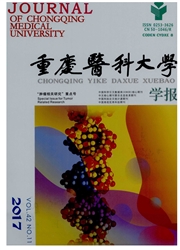

 中文摘要:
中文摘要:
目的:通过了解内毒素和大肠杆菌繁殖对小鼠胚胎发育的影响,探讨污染胚胎对内毒素的耐受性及胚胎污染的解决办法。方法:将150枚小鼠2-细胞胚胎随机分成5组,A组作为对照,B、C组分别加入细菌内毒素0.25 EU/ml、0.5 EU/ml,D、E组均加入大肠杆菌,中途对E组换液,终止细菌污染。在第2天和第4天观察各组胚胎发育情况,对胚胎质量进行评估。结果:(1)对照组存活率和囊胚形成率均100%,内毒素B、C 2组存活率和囊胚形成率均为100%,囊胚形态学观察与对照组无差别。(2)D、E组第2天存活无统计学差异(P〉0.05),第4天E组囊胚形成率明显高于D组(P〈0.01),但囊胚质量较差。结论:菌体繁殖代谢对胚胎的影响大于单纯的内毒素,及时终止污染可部分缓解细菌污染对胚胎发育的影响。
 英文摘要:
英文摘要:
Objective:To explore the embryo tolerance of endotoxin and the solution to embryo contamination by discussing the effect of endotoxin and escherichia coli reproduction on the development of mouse embryos in vitro. Methods:Totally 150 mouse 2-cell embryos were randomly assigned into five groups,named groups A to E. A was control group;endotoxin was added to microdroplet of groups B and C at 0.25 EU/ml,0.5E U/ml;groups D and E were polluted by escherichia coli while culture media of group E was replaced after 24 h. To evaluate the quality of embryos,the development of embryos on the first day(D2)and the third day(D4)in different groups was observed. Results:The development rate and blastocyst rate were 100% in control group as well as in groups B and C without significant differences. On D2,the survival rates were not significantly different between groups D and E(P〉0.05),but on D4,the blastocyst rate in group E was significantly higher than that in group D. Conclusion:Bacteria breeding exerts greater toxic effect on embryo development than endotoxin. Stopping contamination in time can improve the result of embryo development. Low dose of endotoxin has no effect on mouse embryos in vitro.
 同期刊论文项目
同期刊论文项目
 同项目期刊论文
同项目期刊论文
 期刊信息
期刊信息
